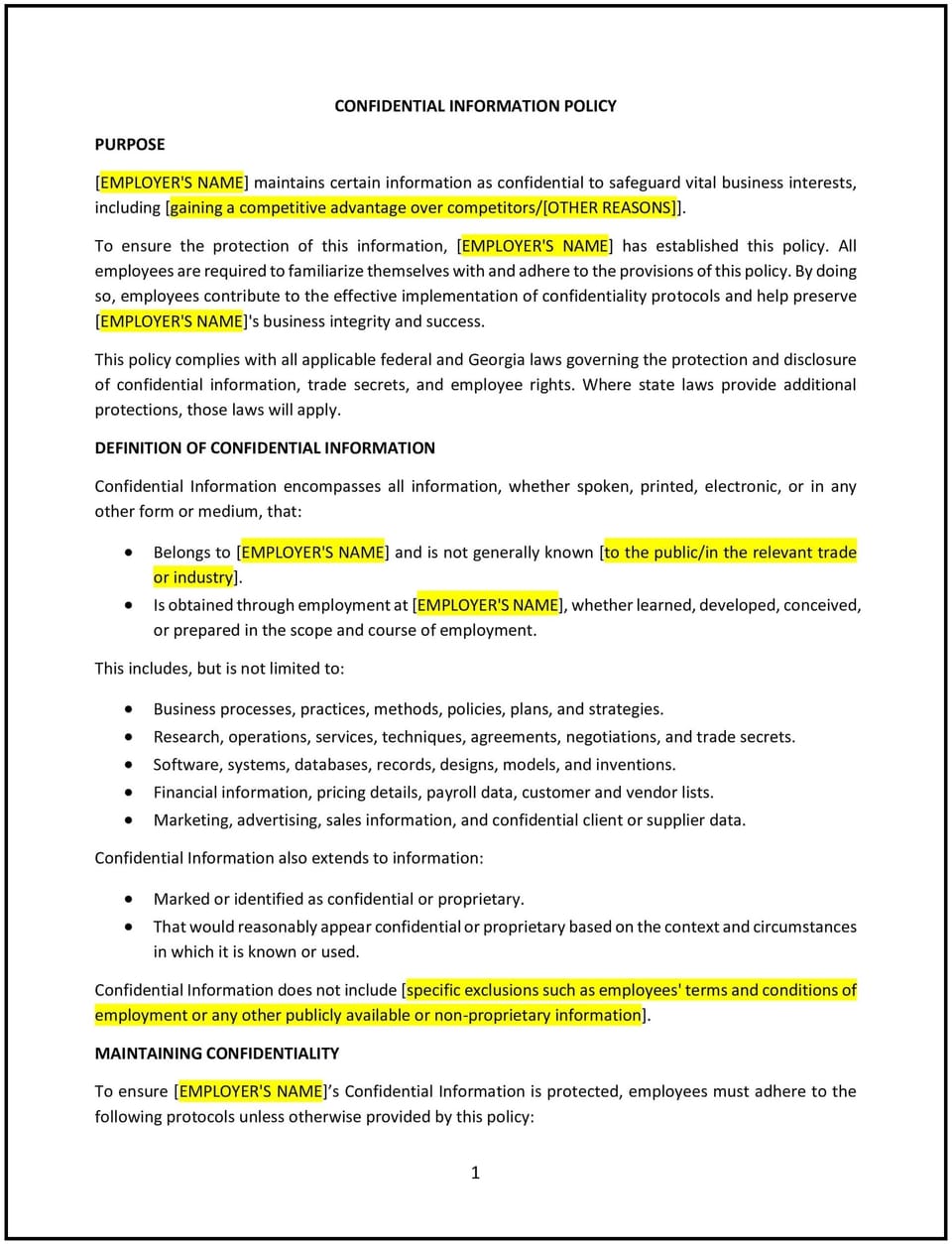Confidential information policy (Georgia): Free template

Confidential information policy (Georgia)
This confidential information policy is designed to help Georgia businesses protect sensitive company and client data. The policy outlines guidelines for identifying, handling, and safeguarding confidential information to minimize risks and promote trust across the organization.
By implementing this policy, businesses can establish clear expectations for data protection, reduce exposure to breaches, and foster a secure work environment.
How to use this confidential information policy (Georgia)
- Define confidential information: Clearly describe what constitutes confidential information, such as trade secrets, financial records, client data, and internal communications.
- Outline employee responsibilities: Specify employees' roles in protecting confidential information, including securing files, limiting access, and using company-approved tools for communication.
- Set guidelines for sharing information: Establish procedures for sharing confidential information internally and externally, including obtaining appropriate approvals and using secure methods.
- Prohibit unauthorized disclosures: Emphasize that employees are prohibited from disclosing confidential information to unauthorized individuals or entities, both during and after employment.
- Address remote work considerations: Include provisions for securely accessing and handling confidential information when working remotely or using personal devices.
- Provide training: Offer regular training on recognizing, handling, and protecting confidential information to ensure all employees understand their responsibilities.
- Review and update regularly: Periodically review the policy to reflect changes in Georgia laws, technology, and workplace practices.
Benefits of using this confidential information policy (Georgia)
Implementing this policy provides several advantages for Georgia businesses:
- Protects sensitive data: Clear guidelines help prevent unauthorized access or disclosure of confidential information.
- Reduces legal and financial risks: Safeguarding confidential data minimizes the potential for lawsuits, fines, or reputational harm.
- Promotes accountability: Employees understand their roles in maintaining data security and the consequences of policy violations.
- Enhances client trust: A strong commitment to confidentiality reassures clients and stakeholders about the business’s integrity.
- Reflects Georgia-specific considerations: Tailoring the policy to local regulations and business norms ensures relevance and effectiveness.
Tips for using this confidential information policy (Georgia)
- Communicate clearly: Ensure employees understand what constitutes confidential information and their responsibilities under the policy.
- Limit access: Restrict access to confidential information to employees who need it for their job responsibilities, using role-based permissions where possible.
- Monitor compliance: Implement tools and processes to track how confidential information is accessed, used, and shared within the organization.
- Address breaches immediately: Establish a plan for responding to breaches or unauthorized disclosures, including notifying affected parties and taking corrective action.
- Foster a culture of security: Encourage employees to prioritize data protection and report any concerns or vulnerabilities they identify.
Q: What is considered confidential information?
A: Confidential information includes trade secrets, financial data, employee records, client information, proprietary processes, and any other sensitive business data.
Q: How should employees handle confidential information?
A: Employees should use secure methods to store and share confidential information, such as encrypted communication tools, password-protected files, and locked physical storage.
Q: What happens if an employee discloses confidential information?
A: Unauthorized disclosure may result in disciplinary action, up to and including termination, as well as potential legal consequences depending on the severity of the breach.
Q: Can employees access confidential information while working remotely?
A: Yes, but employees should use secure methods, such as VPNs or company-approved devices, to access confidential information remotely.
Q: Are employees bound by this policy after leaving the company?
A: Yes, employees are required to maintain the confidentiality of sensitive information even after their employment ends.
Q: How should businesses handle a breach of confidentiality?
A: Businesses should immediately investigate the breach, notify affected parties, and implement measures to prevent future incidents.
Q: How often should this policy be reviewed?
A: The policy should be reviewed annually or whenever there are significant changes in Georgia laws, technology, or business operations that affect confidentiality.
This article contains general legal information and does not contain legal advice. Cobrief is not a law firm or a substitute for an attorney or law firm. The law is complex and changes often. For legal advice, please ask a lawyer.


